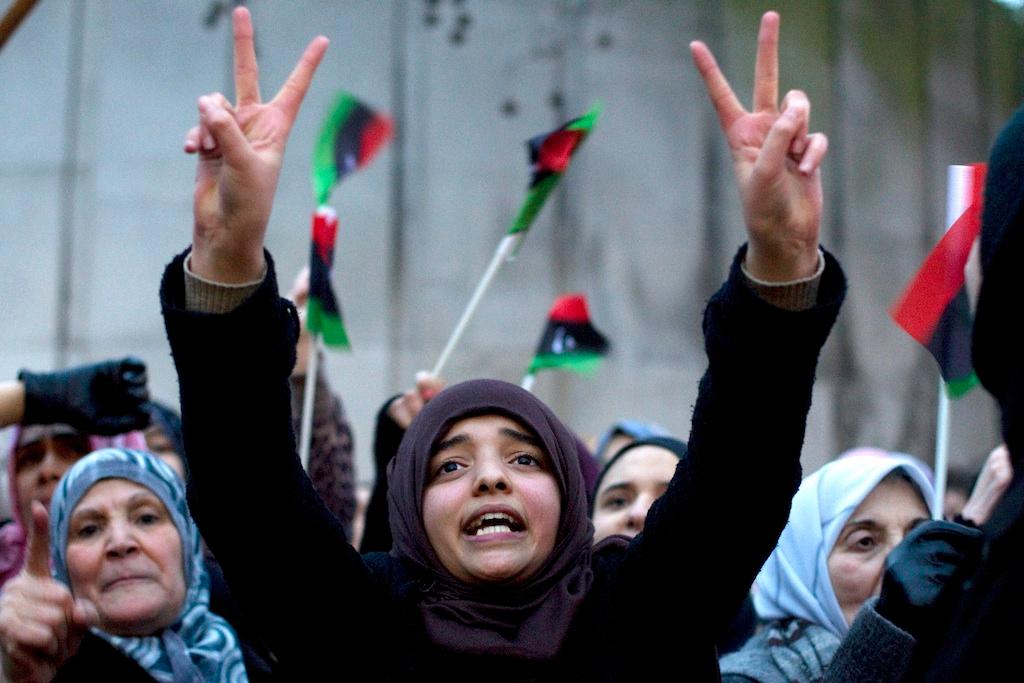Seif al-Islam Gaddafi: We will fight until the end (VIDEO)
A young girl gestures towards the Libyan Embassy in London as several hundred demonstrators gathered to protest the regime in Libya on February 20, 2011.
Muammar Gaddafi's son, Seif al-Islam Gaddafi, vowed to fight until the end in a nationally televised address early Monday morning.
"We will fight to the last minute, until the last bullet," he said, as protests reached the capital, Tripoli.
His father still has control and is leading the fight, he said, but he added that some military equipment had been seized.
The younger Gaddafi accused exiles of fomenting violence and warned that the ongoing protests threaten to throw the north African country into a civil war. But he also acknowledged the army made some mistakes in its handling of demonstrations and promised to put forward some reforms.
"We are not Tunisia and Egypt," he said, referring to uprisings in the region that successfully brought down those nations' rulers in the past two months.
Libyan security forces have killed as many as 200 people in protests that have gripped the country and pose a significant challenge to Muammar Gaddafi's four-decade rule.
U.S.-based Human Rights Watch upgraded its death toll several times Sunday, saying most of those killed were involved in protests in the eastern cities of Benghazi, Bayda and Tobruk. The group called it one of the worst crackdowns so far in the wave of anti-government protests across the Middle East.
"He's threatening Libya and trying to play up on their fears. I don't think anyone in Libya who isn't close to the Gaddafi regime would buy anything he said," Najla Abdurahman, a Libyan dissident, told Al Jazeera after watching the address. "And even if there is any truth to what he said, I don't think it's any better than what the people of Libya have already been living with for the past 40 years. He promised that the country would spiral into civil war for the next 30 to 40 years, that the country's infrastructure would be ruined, hospitals and schools would no longer be functioning – but schools are already terrible, hospitals are already in bad condition."
Protests have been concentrated in the eastern city of Benghazi but spread Sunday night to Tripoli. Demonstrators there converged near the city's Green Square, where they clashed with security officers who witnesses said used tear gas and live ammunition. In some areas of the city, police retreated and protesters carried police equipment and set dumpsters on fire.
“The state has disappeared from the streets, and the people, the youth, have practically taken over,” Monsour Abu Shenaf, a resident of Tripoli, told the New York Times.
A group of 50 Libyan Muslim leaders on Sunday urged security forces to stop killing civilians.
"This is an urgent appeal from religious scholars, intellectuals, and clan elders from Tripoli, Bani Walid, Zintan, Jadu, Msalata, Misrata, Zawiah, and other towns and villages of the western area," the appeal signed by the group of leaders said, Al Jazeera reported. "We appeal to every Muslim, within the regime or assisting it in any way, to recognize that the killing of innocent human beings is forbidden by our Creator and by His beloved Prophet of Compassion (peace be upon him) … Do NOT kill your brothers and sisters. STOP the massacre NOW!"
British Foreign Secretary William Hague, meanwhile, said Saturday that he was "deeply concerned" by the "unacceptable violence" used against protesters in Libya, Bahrain and Yemen.
In a statement, Hague condemned the violence in Libya, saying reports of the use of heavy weapon fire and a unit of snipers were "horrifying." He called on the government to stop using force and rein in the army.
Follow GlobalPost on Twitter: @GlobalPost
